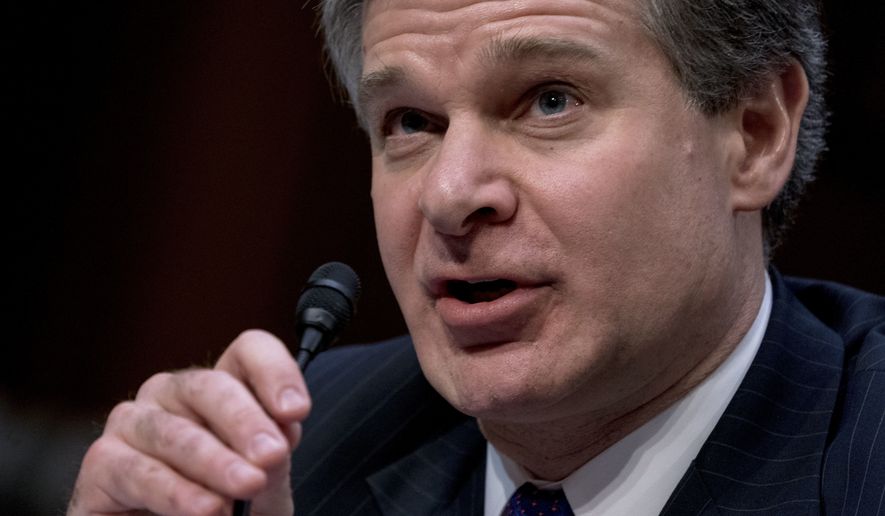The FBI is refusing to disclose additional information about its decision to begin investigating then-candidate Donald Trump in July 2016, prompting Rep. Devin Nunes to threaten a showdown in federal court.
Mr. Nunes, California Republican and chairman of the House Permanent Select Committee on intelligence, sent a letter to the Justice Department saying the FBI will not un-redact internal electronic communications provided to the panel on how the investigation got started. Mr. Nunes says the FBI has blacked out large portions of FBI electronic messages.
The FBI also is resisting Mr. Nunes’ demand to make documents available to lawmakers on the application for a court-approved wiretap on former Trump volunteer Carter Page.
Mr. Nunes has previously disclosed that the bureau relied heavily on the Christoper Steele dossier, paid for by the Democratic Party, to obtain nearly a year’s worth of surveillance on Mr. Page.
Mr. Nunes gained the information from a reluctant FBI only after issuing subpoenas and gaining the intervention of House Speaker Paul D. Ryan, Wisconsin Republican. But since then, the FBI has shut the door again.
Mr. Nunes April 4 letter went to Deputy Attorney General Rod Rosenstein, who appointed Robert Mueller to investigate President Trump and his associates last May. The letter also went to FBI Director Christopher Wray.
DOCUMENT: Read Rep. Devin Nunes' letter to the FBI
Republicans have ended the committee’s probe into supposed Trump-Russia election collusion, concluding that they found no coordination in Russians hacking Democratic computers.
Mr. Nunes said that on March 14, the FBI provided committee investigators “access to still heavily redacted version of the [electronic communications], which — as I informed Director Wray the next day via phone — was unsatisfactory.”
On March 23, the FBI stuck by that decision, citing “sensitivity.”
“The document in question is not highly classified, and law enforcement sources have apparently not been shy about leaking to the press information that the Department and Bureau refuse to share with Congress,” Mr. Nunes said.
He said that in February the FBI refused to give committee members access to the wiretap application authorized under the Foreign Surveillance Intelligence Act (FISA). “This arbitrary resistance to legitimate oversight is unacceptable,” the chairman wrote.
For Mr. Nunes’ previous report on the anti-Trump dossier/wiretap, he relied on Rep. Trey Gowdy, South Carolina Republican, as the only member granted access to those secret documents. His memo was then declassified by the White House.
Mr. Nunes gave the Justice Department until April 11 to comply.
“Be advised that failure to comply in a satisfactory manner will result in the committee pursuing all appropriate legal remedies, including seeking civil enforcement of the August 24 subpoenas in federal district court,” he wrote.
Mr. Nunes has had success against adversaries in court.
He subpoenaed bank records for Fusion GPS, which hired Mr. Steele. Fusion responded by asking a federal judge to block the subpoena. The judge refused, prompting a law firm for the Democrat National Committee to come forward and disclose that the DNC and the Hillary Clinton campaign provided the money.
Mr. Nunes has accused the FBI of abusing the secret FISA process by using opposition research — the dossier — to convince a judge to let agents spy on the other political party.
The FBI withheld from the judge the fact that Democrats financed it, he says.
Rep. Adam B. Schiff of California, the committee’s top Democrat, has opposed all efforts by Mr. Nunes to investigate the unverified dossier and how it was used by Justice Department.
“With their most recent letter, the majority is continuing, and indeed ramping up, their counterinvestigations solely designed to attack the FBI and DOJ in an effort to undermine Robert Mueller and protect the president at all costs,” Mr. Schiff said, according to Politico. “This may suit President Trump, but it is a grave disservice to the country and our law enforcement and intelligence agencies.”
• Rowan Scarborough can be reached at rscarborough@washingtontimes.com.




Please read our comment policy before commenting.